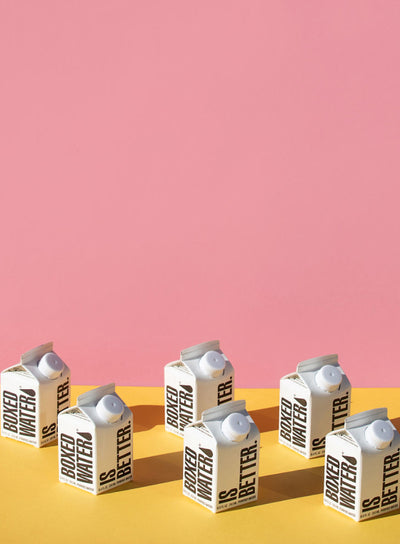Sustainability. It’s a big word that’s used a lot – but what does it actually mean?
Last year, we polled 5,000 people from across the country, and we were pleased to see that 78 percent of respondents had heard of sustainability and understood its general meaning. However, when it came to the actual definition and real-world application, people were less sure. In fact, 55 percent of people believe there’s no difference between recycling and sustainability. While recycling is important, there’s far more to sustainability than just that.
Call out: Read more about upcycling and downcycling.
This confusion is understandable. The term “sustainability,” as well as related phrases like “eco-friendly” and “green,” are not only unregulated, but companies and products misuse the terms in product marketing, too.
As such, we want to help break down “sustainability,” so you understand what we mean when we say that Boxed Water is a sustainable alternative to plastic water bottles.
Defining Sustainability
There are two dictionary-approved definitions of “sustainability” that really resonate with us:
- “The quality of not being harmful to the environment or depleting natural resources.”
- “The pursuit of global environmental balance.”
The first is what you do; the second is how you do it.
As a sustainable water company, we work hard to incorporate these definitions into both our product and how we operate. We use paper made from responsibly managed, sustainable forests – which means harvested trees are continually replenished with new trees. We use municipal water supplies (rather than drilling underground springs) on both sides of the country to dramatically reduce our carbon footprint. And, Boxed Water is 100 percent recyclable!
We think about environmental impact and use of natural resources in everything we do.
Living a sustainable life
There is more for us to do – together. Living a sustainable lifestyle is more than just recycling (sadly, only nine percent of plastic is recycled). Join us in a few of these ways to move towards a better planet:
- Drive less, and walk/bike more.
- Reduce your waste (we love this 30-Day Zero Waste Challenge).
- Recycle everything that can be recycled.
- Support (in volunteer time and donations) places you love the most – beaches, forests, oceans, etc.
- Start a composting pile.
- Try to buy products that are made within a 30-mile radius of your home.
- Use reusable bags or paper bags at the grocery store.
- Opt for reusable water bottles or Boxed Water, instead of convenience plastic water bottles
Like the Dalai Lama XIV said, “If you think you are too small to make a difference, try sleeping with a mosquito.”
Together, we can demand greater sustainability. We must. The health of our planet depends on us.






